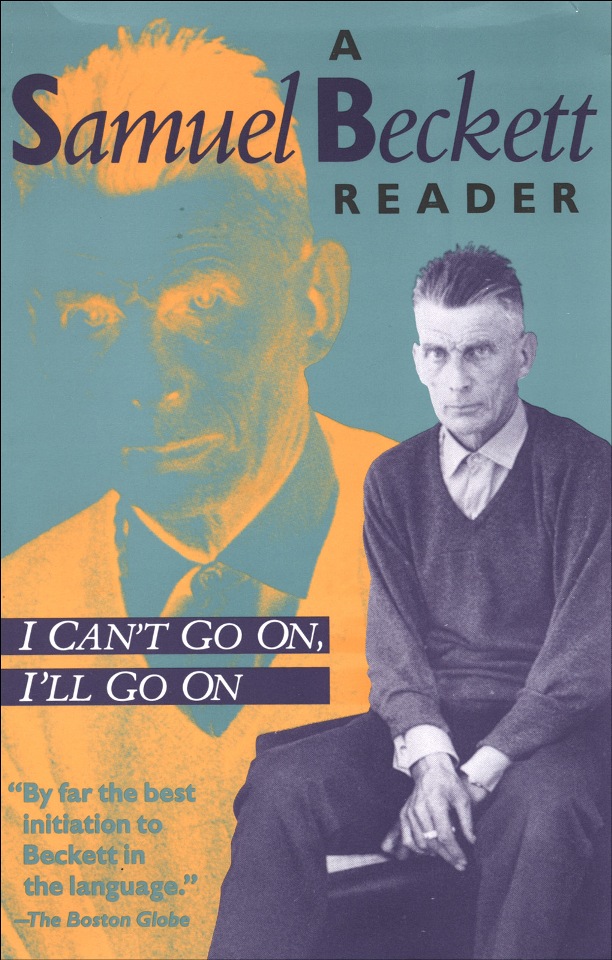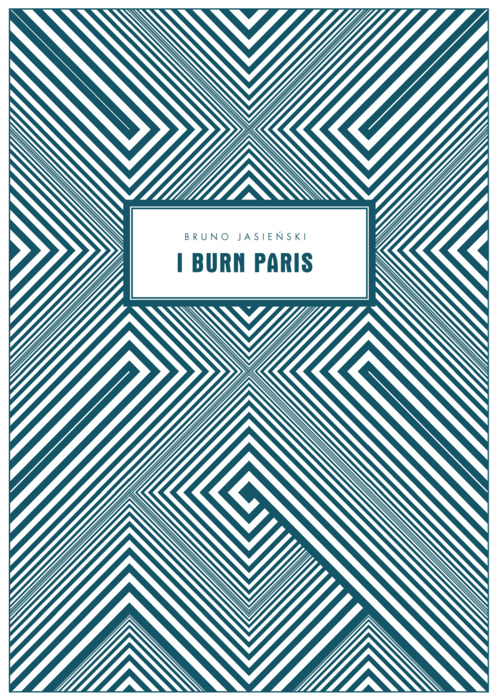Samuel Beckett: I Can’t Go On, I’ll Go On: A Samuel Beckett Reader (1976)
Filed under book, fiction, play | Tags:

“Winner of the Nobel Prize for literature and acknowledged as one of the greatest writers of our time, Samuel Beckett has had a profound impact upon the literary landscape of the twentieth century. In this one-volume collection of his fiction, drama, poetry, and critical writings, we get an unsurpassed look at his work. Included, among others, are:
– The complete plays Waiting for Godot, Krapp’s Last Tape, Cascando, Eh Joe, Not I, and That Time
– Selections from his novels Murphy, Watt, Mercier and Camier, Molloy, and The Unnamable
– The shorter works “Dante and the Lobster”, “The Expelled”, Imagination Dead Imagine, and Lessness,
– A selection of Beckett’s poetry and critical writings.
With an indispensable introduction by editor and Beckett intimate Richard Seaver, and featuring a useful select bibliography, I Can’t Go On, I’ll Go On is indeed an invaluable introduction to a writer who has changed the face of modern literature.”
Edited and with an Introduction by Richard W. Seaver
Publisher Grove Press, New York, 1976
ISBN 0802132871, 9780802132871
621 pages
Herculine Barbin, Being the Recently Discovered Memoirs of a Nineteenth-Century French Hermaphrodite (1978–) [FR, EN, ES]
Filed under fiction | Tags: · biography, gender, hermaphroditism, sexuality

“With an eye for the sensual bloom of young schoolgirls, and the torrid style of the romantic novels of her day, Herculine Barbin tells the story of her life as a hermaphrodite. Herculine was designated female at birth. A pious girl in a Catholic orphanage, a bewildered adolescent enchanted by the ripening bodies of her classmates, a passionate lover of another schoolmistress, she is suddenly reclassified as a man. Alone and desolate, he commits suicide at the age of thirty in a miserable attic in Paris.
Here, in an erotic diary, is one lost voice from our sexual past. Provocative, articulate, eerily prescient as she imagines her corpse under the probing instruments of scientists, Herculine brings a disturbing perspective to our own notions of sexuality. Michel Foucault, who discovered these memoirs in the archives of the French Department of Public Hygiene, presents them with the graphic medical descriptions of Herculine’s body before and after her death. In a striking contrast, a painfully confused young person and the doctors who examine her try to sort out the nature of masculine and feminine at the dawn of the age of modern sexuality.”
“Herculine Barbin can be savored like a libertine novel. The ingenousness of Herculine, the passionate yet equivocal tenderness which thrusts her into the arms, even into the beds, of her companions, gives these pages a charm strangely erotic…Michel Foucault has a genius for bringing to light texts and reviving destinies outside the ordinary.” (Le Monde, July 1978)
Originally published as Herculine Barbir, dite Alexina B., Gallimard, 1978
English edition
Edited and Introduced by Michel Foucault
Translated by Richard McDougall
First published by Pantheon Books, 1980
Publisher Vintage Books, 2010
ISBN 9780394738628
199 pages
via homoluden
Review (Andrea Rossi, Foucault Studies, 2013)
Review (G. S. Rousseau, Medical History, 1981)
Review (Kirkus Reviews)
Commentary (Sarug Dagir Ribeiro, Belo Horizonte, 2010, in Spanish)
Wikipedia (EN)
Adélaïde Herculine Barbin: Mes souvenirs (French, 1978/2002, on Scribd.com)
Herculine Barbin, Being the Recently Discovered Memoirs of a Nineteenth-Century French Hermaphrodite (English, 1980/2010) (updated to OCR’d version, via bbjanz).
Herculine Barbin, Llamada Alexina B. (Spanish, sel. Antonio Serrano, 2a ed., 1985/2007)
Bruno Jasieński: I Burn Paris (1928–) [PL, EN, ES]
Filed under fiction | Tags: · avant-garde, catastrophe, communism, futurism, marxism

I Burn Paris has remained one of Poland’s most uncomfortable masterstrokes of literature since its initial and controversial serialization by Henri Barbusse in 1928 in L’Humanité (for which Jasieński was deported for disseminating subversive literature). It tells the story of a disgruntled factory worker who, finding himself on the streets, takes the opportunity to poison Paris’s water supply. With the deaths piling up, we encounter Chinese communists, rabbis, disillusioned scientists, embittered Russian émigrés, French communards and royalists, American millionaires and a host of others as the city sections off into ethnic enclaves and everyone plots their route of escape. At the heart of the cosmopolitan city is a deep-rooted xenophobia and hatred — the one thread that binds all these groups together. As Paris is brought to ruin, Jasienski issues a rallying cry to the downtrodden of the world, mixing strains of “The Internationale” with a broadcast of popular music.
With its montage strategies reminiscent of early avant-garde cinema and fist-to-the-gut metaphors, I Burn Paris has lost none of its vitality and vigor. Ruthlessly dissecting various utopian fantasies, Jasienski is out to disorient, and he has a seemingly limitless ability to transform the Parisian landscape into the product of disease-addled minds. An exquisite example of literary Futurism and Catastrophism, the novel presents a filthy, degenerated world where factories and machines have replaced the human and economic relationships have turned just about everyone into a prostitute. Yet rather than cliché and simplistic propaganda, there is an immediacy to the writing, and the modern metropolis is starkly depicted as only superficially cosmopolitan, as hostile and animalistic at its core.
This English translation of I Burn Paris fills a major gap in the availability of works from the interwar Polish avant-garde, an artistic phenomenon receiving growing attention with recent publications such as Caviar and Ashes.
First serialized in French as “Je brûle Paris” in L’Humanité in 1928.
Polish edition
Publisher Towarzystwo Wydawnicze “Rój”, Warsaw, 1929
English edition
Translated by Soren A. Gauger and Marcin Piekoszewski
With an Afterword by Soren Gauger
Publisher Twisted Spoon Press, Prague, 2012
ISBN 9788086264370
309 pages
Review (Benjamin Noys, Mute)
Review (M.A.Orthofer, The Complete Review)
Review (Isla Badenoch, Article Magazine)
Commentary (Nina Kolesnikoff, 1982)
Wikipedia (in Polish)
Publisher (EN)
Google books (EN)
Palę Paryż (Polish, 1929, HTML), Alt link
I Burn Paris (English, 2012, EPUB, removed on 2015-1-15 upon request of the publisher)
Anatol Stern’s 1957 preface (Polish), English translation (Issuu.com)
Voy a meterle fuego a París (Spanish, trans. Jorge Segovia and Violetta Beck, 2013, added on 2014-2-2)

